Tchaikovsky Competition Winners Tour | reviews, news & interviews
Tchaikovsky Competition Winners Tour
Tchaikovsky Competition Winners Tour
Gergiev shows off eight young musicians with real care, if uneven results
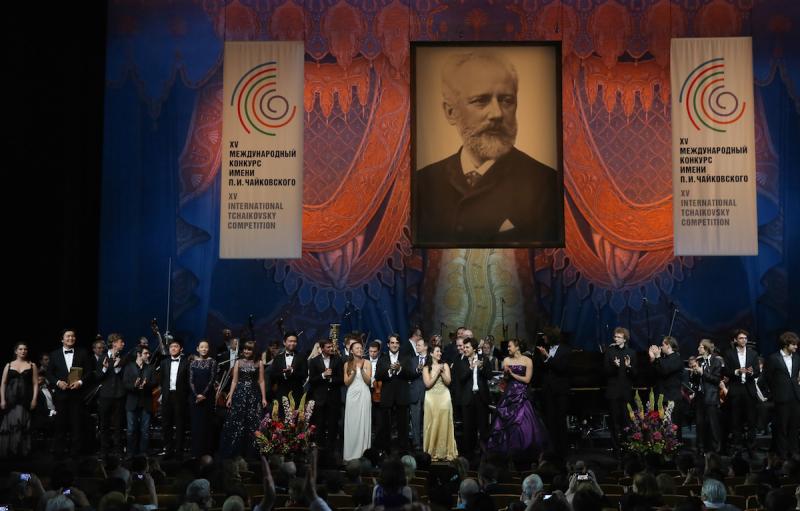
For a few very lucky competition winners there is a shopping trip where they are paraded around the world. A terrific opportunity, though a horrible experience, probably. Most competition winners have only a new line in their CV to stare at after the award ceremony, so the advantage of being a 2015 Tchaikovsky laureate, with a promise of an international tour with Valery Gergiev and the Mariinsky Orchestra, is self-evident.
It also launches high expectations, given that Gergiev was also the competition’s chairman, and this year more than any the Russians were anxious to show that only talent had won prizes, not the traditional backstage trades of old. So the two concerts this week in London and Birmingham generously bestowed on an under-prepared British public (loads of empty seats) a selection of the pianists, singers, violinists and cellists considered by an impeccably first-class jury the pick of the international crop.
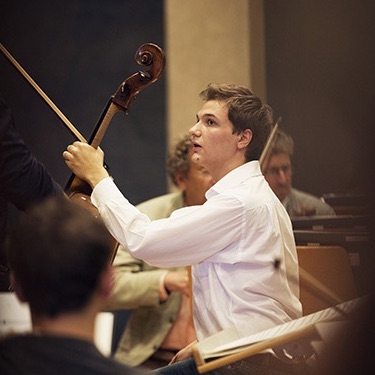 And what a disconcerting distance there can be between competition-winning and winning performance. Monday night at Cadogan Hall in London the piano gold-medallist Dmitri Masleev gave so clumsy a rendition of Rachmaninov’s Second Piano Concerto that I would have thought twice to put him through a qualifying round for technique, let alone artistry. At 27, nerves were hardly an acceptable explanation - so how did a Russian win Russia’s greatest competition, the Tchaikovsky, in Tchaikovsky’s anniversary year, as Mrs Merton might ask? Unfair, for I certainly heard him show real quality in Moscow.
And what a disconcerting distance there can be between competition-winning and winning performance. Monday night at Cadogan Hall in London the piano gold-medallist Dmitri Masleev gave so clumsy a rendition of Rachmaninov’s Second Piano Concerto that I would have thought twice to put him through a qualifying round for technique, let alone artistry. At 27, nerves were hardly an acceptable explanation - so how did a Russian win Russia’s greatest competition, the Tchaikovsky, in Tchaikovsky’s anniversary year, as Mrs Merton might ask? Unfair, for I certainly heard him show real quality in Moscow.
On the other hand, the prizewinning cellist, 20-year-old Berlin-trained Romanian Andrei Ionita (pictured above), stepped up to the plate with a gorgeous, nimble, singing interpretation of Haydn’s First Cello Concerto from 1762 (written almost a century after Ionita’s lovely cello was made). His sweetness of tone, plumb-centre intonation, and captivatingly fleet fingerwork in the finale, enjoyed by the Mariinsky players, made his performance the pinnacle of the London evening - even if he then spoiled the impression with a too lugubrious Bach encore.
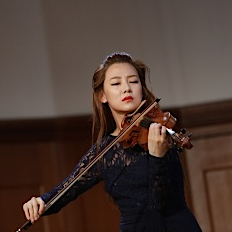 But the acid test was passed - you left wanting to hear more of Ionita. This was also true of Clara-Jumi Kang (pictured left), the German-Korean violinist placed fourth in the competition who swept Birmingham listeners away with her sensitivity and rapt focus in Mendelssohn’s 1845 Violin Concerto. Kang, at 28, has blossomed from toddler years as a child prodigy into an adult musician of poised confidence in floating her small, perfectly tuned sound over the large orchestra. You might say that if there were justice she’d have won the violin contest - yet there is justice, for Gergiev chose her for the tour rather than higher-placed fiddlers. And now we know to look out for her too.
But the acid test was passed - you left wanting to hear more of Ionita. This was also true of Clara-Jumi Kang (pictured left), the German-Korean violinist placed fourth in the competition who swept Birmingham listeners away with her sensitivity and rapt focus in Mendelssohn’s 1845 Violin Concerto. Kang, at 28, has blossomed from toddler years as a child prodigy into an adult musician of poised confidence in floating her small, perfectly tuned sound over the large orchestra. You might say that if there were justice she’d have won the violin contest - yet there is justice, for Gergiev chose her for the tour rather than higher-placed fiddlers. And now we know to look out for her too.
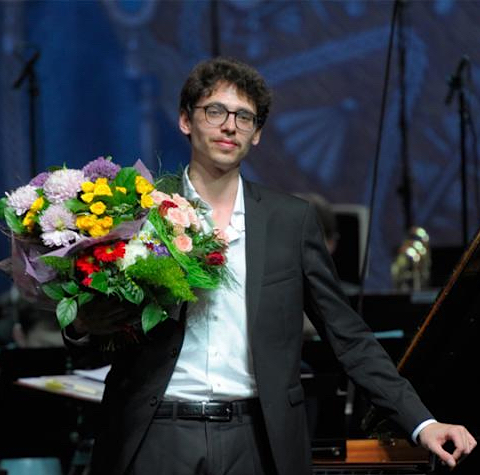 Truly it’s not the first prizewinners but the lesser awards who may flourish better. That's true above all of the French pianist Lucas Debargue (pictured right), who had made Moscow public and critics fall in love with his poetic musicality. His fourth prize reflected his inexperience with orchestras, and the programming frustratingly gave us only chunks of evidence of his spellbinding capabilities, the slow, lullaby movement from the Tchaikovsky First Concerto and the ferocious solo "Scarbo" from Ravel’s Gaspard de la nuit.
Truly it’s not the first prizewinners but the lesser awards who may flourish better. That's true above all of the French pianist Lucas Debargue (pictured right), who had made Moscow public and critics fall in love with his poetic musicality. His fourth prize reflected his inexperience with orchestras, and the programming frustratingly gave us only chunks of evidence of his spellbinding capabilities, the slow, lullaby movement from the Tchaikovsky First Concerto and the ferocious solo "Scarbo" from Ravel’s Gaspard de la nuit.
The nervy 25-year-old is a different sort from the other concert-ready soloists, visibly not happy with having to deliver music in bits rather than an organic whole, and yet searching for interesting rhythmic textures in the familarity of the Tchaikovsky, and making the hairs stand up on my neck with his lightning-storm flashes and the rumbles and spooky whispers of "Scarbo". He is a fantasist, he plays with his ears and his imagination, and had he won the damn competition he’d have been saddled with months and months of routine. Debargue vaut le détour, and will take listeners on a long, mystery ride.
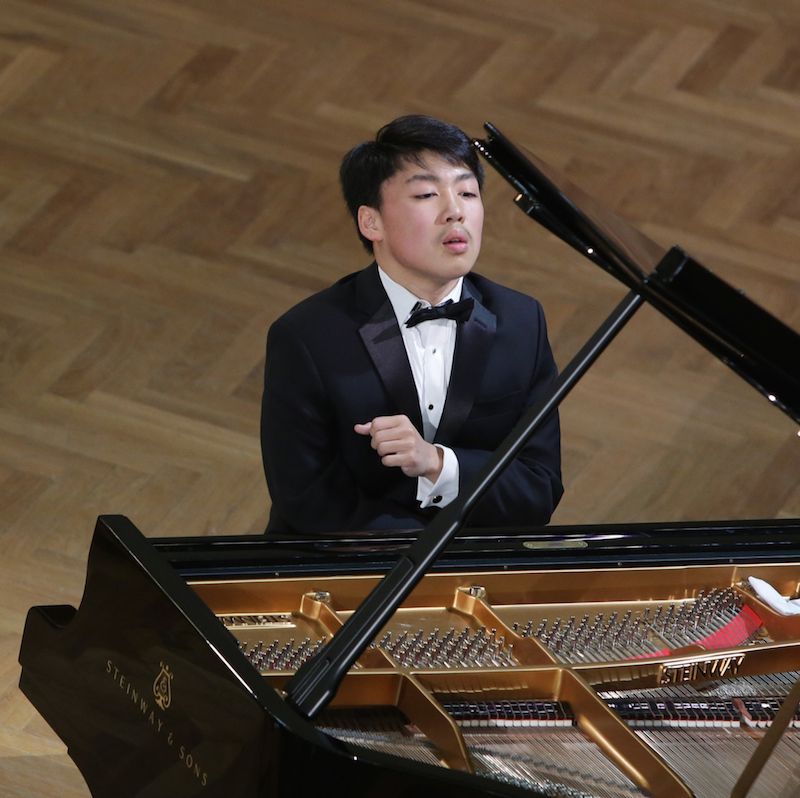 I’m not sure George Li (pictured left) will ever be mysterious, but by gum, this American 19-year-old is fun. The second prize-winner (jointly with another Russian) is a very short man with apparently very small hands, yet he rampaged through Liszt’s First Concerto with winning aplomb. Li puts the li into ebullient, but he overstepped (as Ionita had done) with his encore, Liszt's "La Campanella", a scintillating showpiece that only comes off if it seems a dazzling, gleeful impossibility. He’s not yet got quite that kind of virtuosity, but evidently Li has bags of American can-do spirit, and encourages confidence.
I’m not sure George Li (pictured left) will ever be mysterious, but by gum, this American 19-year-old is fun. The second prize-winner (jointly with another Russian) is a very short man with apparently very small hands, yet he rampaged through Liszt’s First Concerto with winning aplomb. Li puts the li into ebullient, but he overstepped (as Ionita had done) with his encore, Liszt's "La Campanella", a scintillating showpiece that only comes off if it seems a dazzling, gleeful impossibility. He’s not yet got quite that kind of virtuosity, but evidently Li has bags of American can-do spirit, and encourages confidence.
The gold-medal singers sang in both concerts, and though the Mongolian baritone Ariunbaatar Ganbaatar has won the column inches for scooping the Grand Prix as well, I found myself enjoying his clear, beautiful baritone voice in Yeletsky's famous "I love you" aria from The Queen of Spades without quite managing to see him as an operatic baritone character, let alone in the complexities of European song. He's a great gala performer, though.
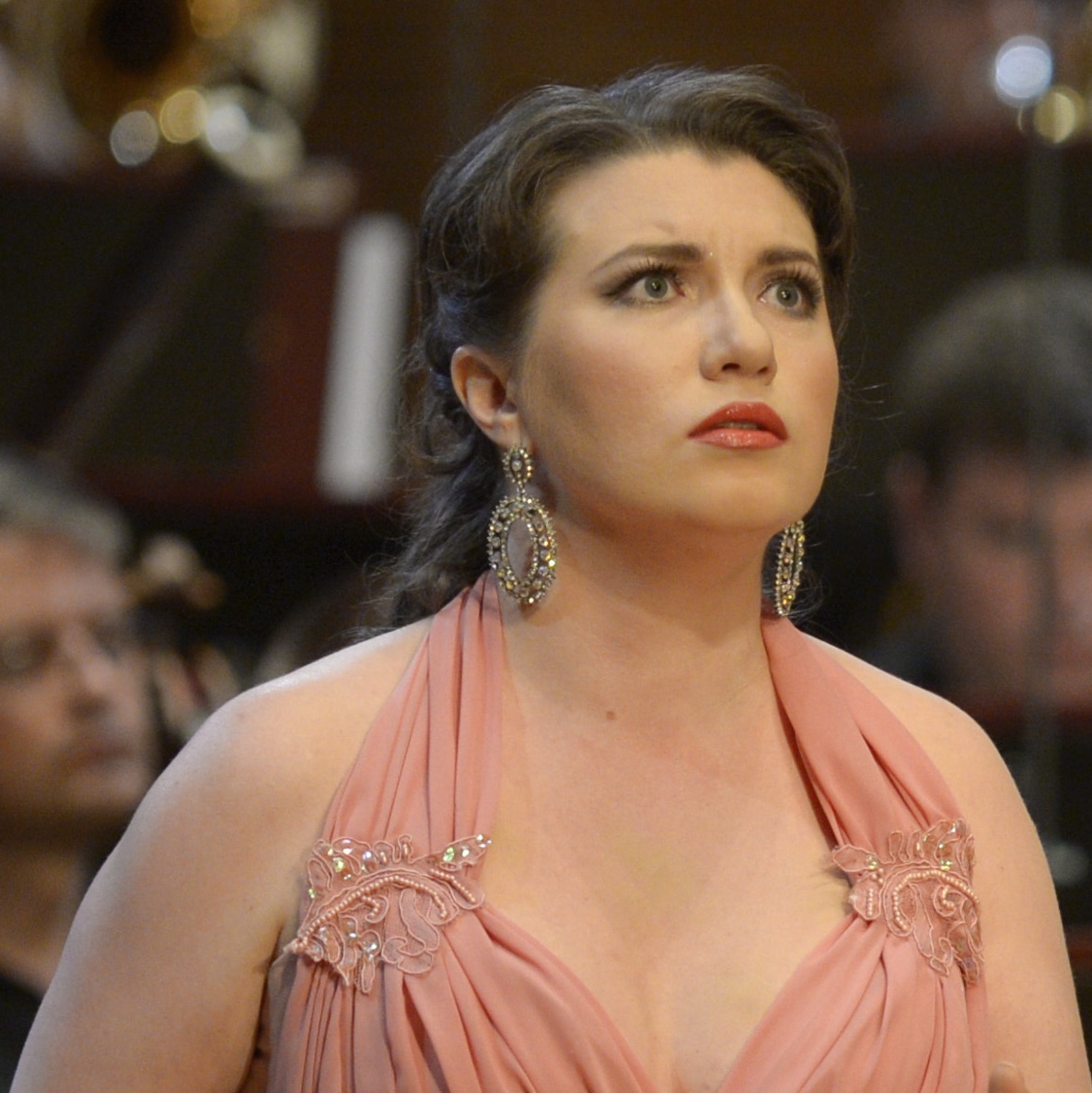 The mezzo Yulia Matochkina (pictured right) is something else; she has a real Russian caramel glory of a voice with a ringing top, and there’s a genuineness in her passionate regret as Joan of Arc, and a fundamental gentleness in her, that promises some involving and interesting opera and song performances from her in future.
The mezzo Yulia Matochkina (pictured right) is something else; she has a real Russian caramel glory of a voice with a ringing top, and there’s a genuineness in her passionate regret as Joan of Arc, and a fundamental gentleness in her, that promises some involving and interesting opera and song performances from her in future.
Gergiev may be a controversial figure, but gave audible nourishment and care to all these young soloists, reining in and texturising the Mariinsky Orchestra players in a range from Haydn to Rachmaninov. It is not easy to make a coherent night of music with so many concerti and arias to deliver, but the programme was well thought through with three sparkling orchestral interludes. Conductor let the orchestra off the leash in Verdi’s Forza del destino overture, and tested the strings in the stratosphere of Wagner's Lohengrin Prelude, and then the opposite, all warm, shimmering suspense and sensuality in Debussy’s L’Après-midi d’un faune.
Much music of great class, though you puzzle over some of the competition results. Still you aren’t going to waste any time puzzling about discovering people like Debargue, Kang and Ionita, for whom the prize is having their future launched so caringly.
rating
Explore topics
Share this article
The future of Arts Journalism
You can stop theartsdesk.com closing!
We urgently need financing to survive. Our fundraising drive has thus far raised £33,000 but we need to reach £100,000 or we will be forced to close. Please contribute here: https://gofund.me/c3f6033d
And if you can forward this information to anyone who might assist, we’d be grateful.

Subscribe to theartsdesk.com
Thank you for continuing to read our work on theartsdesk.com. For unlimited access to every article in its entirety, including our archive of more than 15,000 pieces, we're asking for £5 per month or £40 per year. We feel it's a very good deal, and hope you do too.
To take a subscription now simply click here.
And if you're looking for that extra gift for a friend or family member, why not treat them to a theartsdesk.com gift subscription?
more Classical music
 Batsashvili, Hallé, Wong, Bridgewater Hall, Manchester review - a star in the piano universe
The Georgian pianist brings precision and freedom to Liszt’s warhorses
Batsashvili, Hallé, Wong, Bridgewater Hall, Manchester review - a star in the piano universe
The Georgian pianist brings precision and freedom to Liszt’s warhorses
 Naumov, SCO, Egarr, Queen's Hall, Edinburgh review - orchestral magic rescues some punishing music
Hard-driven Beethoven, monotonous Eötvös, some light from Kernis
Naumov, SCO, Egarr, Queen's Hall, Edinburgh review - orchestral magic rescues some punishing music
Hard-driven Beethoven, monotonous Eötvös, some light from Kernis
 Classical CDs: Shipping lines, sabre dances and sea lice
Neglected piano concertos, Italian art songs and new music for trombones
Classical CDs: Shipping lines, sabre dances and sea lice
Neglected piano concertos, Italian art songs and new music for trombones
 Il trionfo del Tempo e del Disinganno, Irish Baroque Orchestra, Whelan, St George’s Hanover Square review - Handel’s journey of a soul
Pleasure gets the best deal despite Beauty’s struggle to higher things
Il trionfo del Tempo e del Disinganno, Irish Baroque Orchestra, Whelan, St George’s Hanover Square review - Handel’s journey of a soul
Pleasure gets the best deal despite Beauty’s struggle to higher things
 Uproar, Rafferty, Royal Welsh College, Cardiff review - colourful new inventions inspired by Ligeti
Unfussy professionalism from Wales-based new music ensemble
Uproar, Rafferty, Royal Welsh College, Cardiff review - colourful new inventions inspired by Ligeti
Unfussy professionalism from Wales-based new music ensemble
 Attacca Quartet, Kings Place review - bridging the centuries in sound
Grammy-winning quartet bring more American punch than Gallic je-ne-sais-quoi to Ravel
Attacca Quartet, Kings Place review - bridging the centuries in sound
Grammy-winning quartet bring more American punch than Gallic je-ne-sais-quoi to Ravel
 Manchester Collective, RNCM review - exploring new territory
The string quartet – plus percussion and electronics – goes on a journey
Manchester Collective, RNCM review - exploring new territory
The string quartet – plus percussion and electronics – goes on a journey
 Bavouzet, BBCSO, Stasevska, Barbican review - ardent souls in mythic magic
Vivid realisation of fantastical masterpieces by Bartók, Ravel and Janáček
Bavouzet, BBCSO, Stasevska, Barbican review - ardent souls in mythic magic
Vivid realisation of fantastical masterpieces by Bartók, Ravel and Janáček
 Levit, Budapest Festival Orchestra, Fischer, RFH review - anger unleashed, fantasy finessed in Prokofiev
Instant communication from Berlin-based pianist and Hungarian army of generals
Levit, Budapest Festival Orchestra, Fischer, RFH review - anger unleashed, fantasy finessed in Prokofiev
Instant communication from Berlin-based pianist and Hungarian army of generals
 A Form of Exile: Edward Said and Late Style, CLS, Wood, QEH review - baggy ferment of ideas and sounds
Superlative actors and musicians in an over-ambitious event running to three hours
A Form of Exile: Edward Said and Late Style, CLS, Wood, QEH review - baggy ferment of ideas and sounds
Superlative actors and musicians in an over-ambitious event running to three hours
 BBC Philharmonic, Bihlmaier, Bridgewater Hall, Manchester review - an International Women's Day special
Spotlight on today’s composers and one of their sisters from the past
BBC Philharmonic, Bihlmaier, Bridgewater Hall, Manchester review - an International Women's Day special
Spotlight on today’s composers and one of their sisters from the past

Add comment